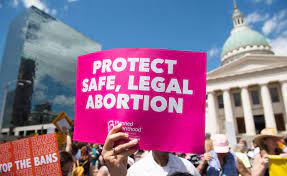OP-ED: New Abortion Bills Give Government Control Over Your Body

New restrictive abortion bills passed in Arkansas and Texas have caused outrage among abortion rights activists.
June 2, 2021
In 1973, the United States Supreme Court prohibited states from imposing restrictions on first-trimester abortions and permitted them to impose restrictions on second-trimester based on certain guidelines and third-trimester abortions at their discretion in the monumental Roe v. Wade Supreme Court case. Since 1973, this ruling has been challenged numerous times. In the past several months, several governors have passed legislation that violates the bodily autonomy of individuals by instating restrictions on their right to access safe abortions.
In March of 2021, Arkansas Governor Asa Hutchinson instituted a ban on all abortions through bill SB6, except in the case of saving the life of a pregnant woman. Those who infringe upon the terms of SB6 can receive a prison sentence of up to ten years and a fine of up to $100,000. In May of 2021, Texas Governor Greg Abbott followed suit by signing bill SB8 into law, banning abortions from occurring after six weeks of pregnancy, when a heartbeat is detected. This law provides people with little time — if any time at all — to make decisions regarding their pregnancy, since six weeks of pregnancy is just two weeks longer than the average menstrual cycle.
Despite abortion having been legalized nationwide since 1973, the right of individuals to access abortion has been challenged for decades. The Hyde Amendment, which prevents Medicaid from covering abortion except in instances where the pregnant individual’s life is in danger or when the pregnancy is caused by rape or incest, was implemented in 1976, three years after Roe v. Wade’s ruling. This contributes to the inequalities that exist in accessing abortion by significantly restricting federal coverage of abortions.
According to the Planned Parenthood Action Fund, “When policymakers deny insurance coverage for abortion, people are either forced to carry a pregnancy to term or pay for care out of their pocket. So, the Hyde Amendment is particularly harmful to people with low incomes, people of color, young people and immigrants — who all disproportionately rely on Medicaid for their health care coverage.”
Restricting access to abortion prompts individuals who desire to terminate their pregnancy to seek unsafe abortions that endanger their safety and lives. Furthermore, the Hyde Amendment’s challenges in preventing Medicaid coverage for abortions can put individuals in financial jeopardy as they may need to forgo necessities to afford abortions out of pocket. Its exception for pregnancies that occur due to rape or incest perpetuates the notion that for people to exercise authority over their bodies, someone must violate them.
Regardless of people’s individual opinions on abortion, it is a decision that solely impacts the individual who undergoes it and is, therefore, is not for governmental control. The right to choose whether or not to have an abortion is unequivocally an individual’s constitutional right that should not fall under the jurisdiction of any government.



